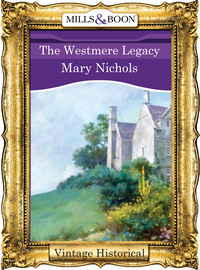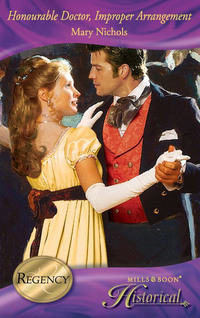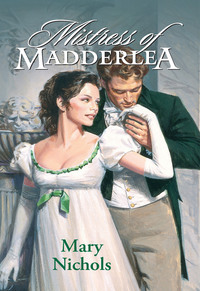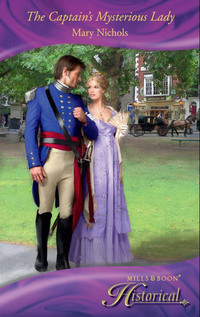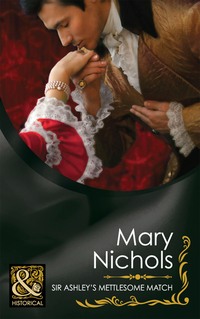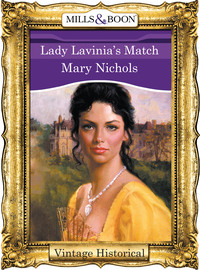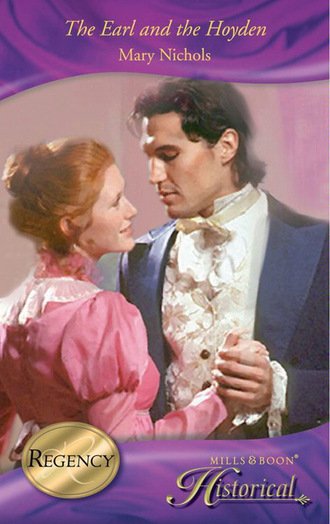
Полная версия
The Earl and the Hoyden
‘Oh, you don’t know how I have longed for you to come home,’ she said, leading him into the house.
He paused to speak to Travers. ‘Find the stables and see to the horses, I’ll join you when I can.’
‘Did you receive my letters?’ she asked, as they stepped into the hall and she relieved him of his riding cloak and hat. She was, he noticed, very thin, her face lined with worry, and he was sorry if he had been responsible for putting any of the lines there. And though she was dressed in deepest mourning, her blue eyes shone and her mouth smiled with joy at having him home again. ‘I wondered why you did not come at once.’
‘I was away from headquarters and could not be contacted,’ he said, following her into the drawing room and refraining from reminding her that his letters home had gone unanswered. ‘It was nearly two months before I returned and your first letter was put into my hand, only the day before the second arrived. I came as soon as I could. I am only sorry I did not arrive in time.’
‘Never mind, you are here now. Sit down and let me look at you.’
Roland pulled up a chair and sat on it, his head full of what he had seen: the poor state of the big house, the neglected air about the village, the arrogant Miss Cartwright and her assertion Browhill did not belong to the Amerleigh estate. When and why had it changed hands?
‘You are grown so big and strong,’ his mother went on.
‘That is down to the army, Mama. It made a man of the boy.’
‘You will always be my boy.’
He smiled and reached for her hand. ‘I know.’ He paused. ‘I passed the house. It looked thoroughly neglected. What happened?’
‘It is a long story. Your papa lost heart after you left. He did not seem able to do the work he always used to do and things went from bad to worse. Two years ago he had a seizure and Dr Sumner said he was not to be worried. I wanted to write and tell you what was happening, but your father forbade it. We moved here so that he might be peaceful and hoped to let the house, but there were no takers. After his last attack he suddenly changed his mind and said he must see you.’
‘I am deeply sorry I was too late. I would have been glad to be reconciled with him. Did he ever forgive me?’
‘I think so, though I always thought there was nothing to forgive, except perhaps your hasty departure, when he might have come round to listening to you, and you to him.’
Roland did not think so, but forbore to say so. ‘What would you have me do?’
‘It was his wish that you restore the Hall. It is, after all, your home. It has been the home of the Amerleighs for hundreds of years. One day you will marry and pass it on to your sons.’
‘I know, Mama.’ He gave a sigh. From what he had seen, it would be a monumental task and one that would take every penny he owned and more. ‘I had better see Mount-ford and talk it over with him.’
‘Yes. He will tell you about the lawsuit.’
His heart sank. ‘The lawsuit?’
‘Yes, your father was in dispute with Mr Cartwright over a strip of land that he said the man had cheated him out of.’
‘Browhill?’
‘Yes, how did you know?’
‘I came that way and met Miss Cartwright.’ He smiled wryly at the memory. ‘We had a few words about it.’
‘Oh, no, not you too. Will there be no end to it?’
‘I do not know. Tell me what happened.’
‘Later. Now, I must go and have a room made ready for you, then you can change and we will have dinner.’ She bustled away.
He sat on for a few minutes, gazing at a portrait of his father that hung over the mantel. It showed a big, proud man, master of all he surveyed, supremely confident. How had he come to be so far in debt he had had to leave his ancestral home? His mother seemed reluctant to tell him.
He stood up and left the room to go in search of her and found her in one of the bedrooms supervising the making up of a bed for him. His portmanteau and haversack had been brought up and put on a chest under the window. A jug of hot water had been placed on the wash stand. ‘There, will that do?’ she asked.
‘Very well, Mama. I am used to far less than this.’
‘Come down when you are ready. I do not know what Mrs Burrows is making for dinner, but I am sure she will do her best.’
He washed quickly, changed his shirt, put on his best uniform and returned downstairs where they were served a simple meal in the dining room by Mr Burrows. He had been the butler even longer than his wife had been the cook. He had always been one to stand on his dignity in the hierarchy of the servants’ quarters and held sway over at least twenty indoor servants. Now, according to his mother, Mr and Mrs Burrows and one girl were all the indoor staff they had.
‘And outside?’ he asked, after Burrows had left them to serve themselves. ‘Gardeners, coachmen, grooms?’
‘We go out so little I cannot remember the last time the coach came out. I drive the gig when I want to go calling or shopping. We only have one horse and Bennett looks after it. He still does the garden and keeps an eye on the big house.’
Roland speared a piece of mutton on his fork. ‘Is that all that’s left?’
‘Yes, but we do not need them here and would have no room for them in any case. Some of them went to Mandeville. Jacob Edwards has done very well there. You remember him; he is a year or two older than you. He used to share your lessons before you went away to school and you used to go fishing together in the holidays.’
‘I remember.’ Jacob had been with him the first time either of them had set eyes on Charlotte Cartwright. It was at a horse fair that had come to Amerleigh. The boys had been enjoying themselves going round all the stalls and listening to the banter of the stallholders and had stopped at a shooting range where a row of wooden ducks were set up for the contestants to shoot down. Jacob tried first and had hit seven of the ten. Roland had his turn and hit the first nine, but failed at the last.
‘Missed!’ said a triumphant voice. He had swivelled round to find a girl of about twelve standing close by. She was well clad and well shod and her reddish hair was crammed under a blue chip bonnet, so she was not one of the villagers. There seemed to be no one with her.
‘You think you can do better?’ he had demanded, while the stallholder looked on, grinning from ear to ear.
‘Yes.’
‘You are more likely to shoot yourself than the ducks.’
She held out a brown freckled hand. ‘Give me the gun and I’ll show you.’
He laughed and gave it to her and was thoroughly chagrined when he found she could load and prime it and was astounded when, hardly seeming to take aim, she shot down all ten ducks in quick succession. ‘I told you so, boy,’ she said, returning the gun and taking a tiny squealing piglet from the stallholder as her prize. Any other girl of his acquaintance would have been more careful of her clothes than to hold the animal in her arms, but she did not seem to mind. Her father had come and fetched her then and given her a jobation for giving him the slip, but she just laughed at him.
It was Jacob who found out who she was: daughter of Mr Cartwright the owner of Mandeville, an estate on the other side of the hill from Amerleigh. Roland had returned to school without seeing her again that year, but on subsequent holidays he and Jacob had come across her out riding or fishing and they had shouted a greeting and sometimes stood over her on the bank to watch her fish. It was only on reflection now that he realised she had always been alone and he wondered if she had ever had any siblings or playmates. Jacob had admired her, for all the neighbourhood considered her wild and unmanageable. Roland had gone away to university and did not see her again until a few days before that fateful ball, galloping over Browhill, just as he had seen her today. She had not changed.
‘Father paid for Jacob’s schooling later, didn’t he?’ he queried, coming back to his conversation with his mother.
‘Yes. He has climbed his way up to be a lawyer and is Miss Cartwright’s man of business.’
‘Rubbing salt in the wound.’
‘Yes. It was all too much for your poor papa and he seemed to give up. The estate became neglected and he thought of nothing but revenge. It soured him, Roland.’
‘And he blamed me.’
‘In a way I suppose he did.’
‘And you? Do you blame me?’
‘No, you were young with your life before you and you did not know the whole story. I begged your father to explain the position to you, but he said he would expect you to comply simply because he said it was necessary.’
Roland closed his mouth on the comment that it was most unlikely that even an explanation would have made him change his mind. In the middle of the most lavish ball he could ever remember his parents holding, he had been told by his father that he was expected to propose to Miss Cartwright that very evening. He remembered his angry reaction as if it were yesterday. ‘Not for anything,’ he had said. ‘The chit is barely out of the schoolroom, if she was ever in one. She is a hoyden and ought to have been a boy. She is certainly plain enough.’ They had had a bitter quarrel and he had stormed up to his room where he had remained despite the entreaties of his mother to come down and his father’s threats that he would cut him off without a penny if he defied him. ‘If you do not obey me in this,’ he had shouted through the thick oak door, ‘you are no son of mine.’
Next morning Roland had left the house with no luggage except a small carpet bag and taken a stage to London, where he bought into the 95th, which later became part of the Rifle Brigade. His rise to his present rank had been made on merit as more senior officers had been killed and wounded, which he supposed was something the war had done for him.
‘Why was it so important to Papa?’
‘Your father and Mr Cartwright were once friends in a way, though the man had no breeding to speak of. They were both magistrates and used to meet at the courthouse and at the sheep market and talk about business. Mr Cartwright suggested our name coupled with his wealth would together make one of the most influential families in the kingdom. Miss Cartwright’s dowry would be prodigious; not only that, he was prepared to stand buff for your papa’s debts, which at that time were considerable. And there was cash in hand too. All to give his daughter a title. The offer was too tempting to resist and your father accepted a payment in advance, which of course the man demanded back when you left. Unfortunately, most of it had already been spent, some on that disastrous ball, on paying debts, and on new furnishings to impress Cartwright. I also had new gowns; your father said it was a matter of pride that his wife should be dressed in the latest mode…’
‘He did all that without consulting my wishes,’ he said, wondering if the proposed engagement had been as much a surprise to Miss Cartwright as it had been to him.
‘I am sorry for that, but he supposed you would agree for the sake of the dowry. You must not condemn him too harshly, Roland. In his day parents often arranged marriages for their children and the children rarely complained. Marriage was more of a business matter then, a joining of great houses, the making of a dynasty. If a man needed more than his wife could provide, he could easily find it elsewhere, and as long as he was discreet she would turn a blind eye…’
‘Times have changed, Mama. I prefer to find my own bride and I most certainly would not expect her to turn a blind eye, as you put it.’
‘Have you? Is there a lady…?’
‘No. I have been too busy fighting a war to worry about courting.’
‘Then it is not too late.’
‘Good Lord! Surely I am not expected to pay court to the chit, just as if the last six years had never been.’
‘No, I can understand you would not want to do that and it would not do. Two such strong characters as you both are would make for endless conflict. She is not one to bow to any man, husband or no.’
‘How far has this litigation gone?’
‘I have no idea, no one confided in me. Mountford will tell you.’
‘So the new Earl has come home at last,’ Mrs Elliott said, helping herself from a tureen of vegetables offered by one of Charlotte’s footmen. An invitation to Mandeville for supper was worth accepting if only because the food was sumptuous, much better than anything she was able to provide at the vicarage. Tonight Charlotte was entertaining the Reverend Mr Elliott, Mrs Elliott and their son, Martin, who had just been ordained as curate and was waiting for his first post, together with Sir Gordon and Lady Brandon and their twenty-year-old daughter, Martha. ‘The Reverend saw him arrive on horseback, with no luggage or servants, except one dowdy-looking fellow in army overalls, is that not so, husband?’
‘Yes,’ the parson agreed. ‘I hardly recognised him, he was so dusty and travel-stained. He had on a dark green jacket, which had certainly seen better days, and a black shako, just as if he were a common soldier. He dismounted to go into the church and stood before the Amerleigh vault. He was there some time in quiet contemplation and it was then I guessed who he was.’
‘Did you discover if he means to stay?’ Sir Gordon asked. Both Sir Gordon and his wife had succumbed to good living and were almost as round as they were tall. Sir Gordon owned a cotton mill in Scofield, not far from Charlotte’s, but as far as she knew, he rarely went near the place and knew very little of what went on there, but she invited him and his wife to dine occasionally because he was a great gossip and enabled her to keep abreast of what her competitors were doing.
‘And why would he not? It is his home and his inheritance, after all.’ This from Martin Elliott. He was a pale young man, and very thin, but not ill-looking.
‘Inheritance!’ Sir Gordon exclaimed. ‘Millstone would be a better description. How he will bring it about, I do not know.’
‘He probably has a private income,’ Lady Brandon put in, while Charlotte remained silent. She did not want to say anything that might inadvertently reveal that she had already met the gentleman in question. ‘Or he has become rich by the war. It sometimes happens, I believe. The victors plunder the vanquished.’
‘He will need every groat he can lay his hands on,’ Sir Gordon said. ‘His father has left the place in a sad state.’
‘Why did they quarrel?’ Martha asked, while Charlotte held her breath, hoping fervently none of her guests knew the real truth.
‘No one knows for sure,’ Mrs Elliott said. ‘But it was very sudden. I have heard it said it was over a woman. The Viscount, as he was then, was banished in disgrace.’
‘Now, now,’ her husband gently chided her. ‘It is no business of ours.’
She lapsed into silence, much to Charlotte’s relief, but the pause was soon filled by Lady Brandon. ‘Do you think we should call on him and welcome him home?’ she asked. ‘Though whether that be the great house or the dower house, it is difficult to say.’
‘I would not go so far as to suggest that, my love,’ her husband said. ‘He might find it a trifle embarrassing. Hold your horses and wait to see what he does. He might not stay.’
‘And whom do you suppose will take over the estate if he does not?’
‘I feel sorry for him, coming back to that,’ Mrs Elliott said, earning a sharp glance from Charlotte.
‘Why?’ Sir Gordon demanded. ‘If rumour be true, it was his quarrel with his father that sent the poor old man out of his mind.’
‘Was he out of his mind?’ Lady Brandon asked.
‘Of course he was. No man in his right mind would allow his estate to be run down like that. Do you not agree, Miss Cartwright?’
Charlotte, directly addressed, found herself saying, ‘I do not see how anyone but his doctors can know the state of his lordship’s mind, but it is very true the estate is in a parlous state.’
‘I am surprised you have not offered to buy it yourself,’ Sir Gordon said. ‘No doubt you could get it for a song.’
Charlotte smiled, thinking of the Earl and his fierce claim that the land on which they had almost collided had been Amerleigh land. If she was any judge of character, he would not part with his birthright to her. But, oh, taking the Amerleigh estate from him would be sweet revenge for the humiliation she had suffered at his hands. ‘What use would I have for such a place?’ she asked. ‘And we are talking as if the Earl is going to sell up.’
‘If he has any sense he will,’ Sir Gordon said.
‘I would not,’ Charlotte said suddenly. ‘There are too many people’s livelihoods depending on a healthy estate. I would look on it as a challenge.’
‘Is he one to rise to a challenge, do you think?’ Lady Brandon asked.
Charlotte shrugged. ‘I have no idea, but we shall soon see.’
The return of the Earl of Amerleigh caused no end of gossip in the village. The main gist of their curiosity was centred on whether he had returned with a fortune and whether he had married and would be bringing his wife to the Hall just as soon as it had been refurbished. And if he was not married, why, then he might be looking for a wife! Single young ladies in the parish and for several miles around were suddenly alert to the possibilities. Hence the bigger than usual congregation at church the following day.
Wondering what to wear, Roland had surveyed his wardrobe, which did not take long. Apart from his ordinary uniform and a dress uniform that he wore on formal occasions, he had a pair of overalls, a riding coat of Bath cloth which he had been wearing when he enlisted, a pair of calfskin breeches, half a dozen shirts, a change of underclothes, and a spare pair of boots. He had never needed more. He found some of his old clothes in a trunk, which his mother had brought to the dower house. There was among them a black frock coat and breeches, but when he tried them on, he found they were several sizes too small. The Roland who had gone away had been a stripling of twenty-one, slim as a reed; the Roland who had returned was broad of shoulder, deep-chested, with muscular legs and arms. He had perforce to ask Travers to spruce up his best uniform and tie a black mourning ribbon about his sleeve. Bennett had brought out the carriage, for which Roland had hired horses, and took immense pride in cleaning it so it gleamed as it once had, and he and his mother travelled in that.
After the service, the Countess placed herself between Roland and the parson on the church path to greet everyone and introduce them to her son. Among them were Lord and Lady Gilford, who had a substantial mansion on the road between Amerleigh and Scofield, Mr and Mrs Edward Trent of Shrewsbury; Sir Gordon and Lady Brandon, who had a country house on the slopes above Scofield, and several others whom Roland did not know. They were all accompanied by offspring.
That might have been the end of it, but the parson, conscious of his role as conciliator, addressed Lady Brandon. ‘My lady, I am sure the Earl needs no introduction, but I am persuaded you would wish to welcome him back in our midst.’ And to Roland. ‘My lord, you remember Sir Gordon and Lady Brandon, do you not?’
Roland bowed. ‘Your servant, my lady. Sir Gordon.’
Her ladyship acknowledged him with a slight inclination of the head. ‘My lord.’
Sir Gordon shook his hand and then drew Martha forward. ‘May I present my daughter, Martha?’
He bowed, remembering the schoolgirl he had seen about the village with her governess when he had been home in his youth. She had become an attractive young lady. ‘Miss Brandon.’
She bobbed a curtsy and kept her eyes downcast. ‘My lord.’
The parson had not done. ‘My lord, I believe you are acquainted with Miss Cartwright.’
It was only then he realised that Charlotte stood behind them. Gone was the strange riding gear and in its place was a watered silk gown in a soft dove-grey, topped with a matching short pelisse. Her amber hair, which had been so windswept when he had come upon her riding, was now pinned up beneath a simple straw bonnet, but he could see that it was already straining to escape.
He realised quite suddenly that plain was an inaccurate way to describe her. Not that she was a beauty; her features were too strong for that, but handsome might do. Her eyes were her most striking feature and they were looking at him in a way that made him feel uncomfortable. Disdainful, amused, irate, wary—he wasn’t sure how to describe that look. As far as he knew, she had not heard the hateful description of her he had flung at his father all those years ago, but remembering them now made him feel ashamed of words that never should have been uttered by anyone calling himself a gentleman, however irate he had felt. ‘Your servant, Miss Cartwright,’ he said, touching his hand to the peak of his shako.
She had thought he was tall when mounted, but now she realised he must be over six foot in height, a giant of a man and not one to be easily intimidated. But neither was she. ‘My lord,’ she responded coolly. She had not been brought up to attend church regularly, but she had realised that not to go might make for gossip. As she did not want anyone to connect her with his disappearance six years before, she had come, telling herself that she would take herself off immediately after the service. She had not bargained for the parson’s interference. She turned from him to the Countess. ‘My lady, how do you do?’
‘I am well, thank you. And you?’ The Countess was, as ever, graciousness itself, and whatever Charlotte felt about the late Earl and his son, she liked her and felt sorry for her.
‘I am in fine fettle,’ she said, risking a glance at the Earl. He was looking at her intently, as if trying to read what was going on in her head. She hoped not, because her thoughts were confused. She had to admit she found his rugged good looks attractive, more so than the immature looks of the boy who had disdained her, and had to tell herself sternly that he could never be forgiven that.
‘Did you have a good voyage home?’ the Countess asked.
She laughed. ‘The sea was somewhat rough, but I survived it.’
‘Miss Cartwright has recently returned from a visit to Jamaica,’ his mother explained to Roland. ‘She has a sugar plantation out there.’
‘Indeed?’ he said. So that accounted for the name of her house; Mandeville he knew to be a Jamaican town. ‘And slaves, too, no doubt?’
‘The trade slave has been outlawed, Lord Temple,’ she said, noticing the Countess’s look of shock that he should mention such a thing.
‘The trade, yes, but not the ownership.’
‘True, but there would be hue and cry if the law decreed they had to be freed,’ she said. ‘We should have no sugar, tobacco or cotton. It would be disastrous for the British economy.’ She wondered why she did not tell him that her slaves had been given their freedom instead of repeating parrot fashion the arguments her father had used when she had questioned him on the subject. Obstinacy, she supposed, and a mischievous wish to score a point over him.
His mother touched his arm, warning him not to continue. ‘Point taken, Miss Cartwright,’ he said, smiling as if he knew perfectly well what she was about. It disconcerted her to think he could read her mind like that.
‘Have you ever visited the Indies, my lord?’
‘No, never.’
‘Perhaps you should.’
‘One day, perhaps. Did you not find the climate uncomfortably hot?’
‘I do not suppose it was any worse than the heat in Spain.’
‘Probably not,’ he agreed. ‘One becomes used to it. But it is good to be back in England’s softer climate, do you not agree?’
‘Oh, most decidedly, and especially in springtime.’
The conversation ground to a halt. His mother plucked at his sleeve. ‘Good day, Miss Cartwright.’ He touched his hat again and, taking his mother’s arm, guided her to their carriage to return to the dower house.
‘Roland, how could you?’ his mother scolded him. ‘It is not like you to be discourteous.’
‘Perhaps I let my feelings on the subject carry me away,’ he replied unrepentantly.


